外研版英语八年级上册ModuleUnit
外研版英语八年级上册module 单元知识点归纳总结(详细版)
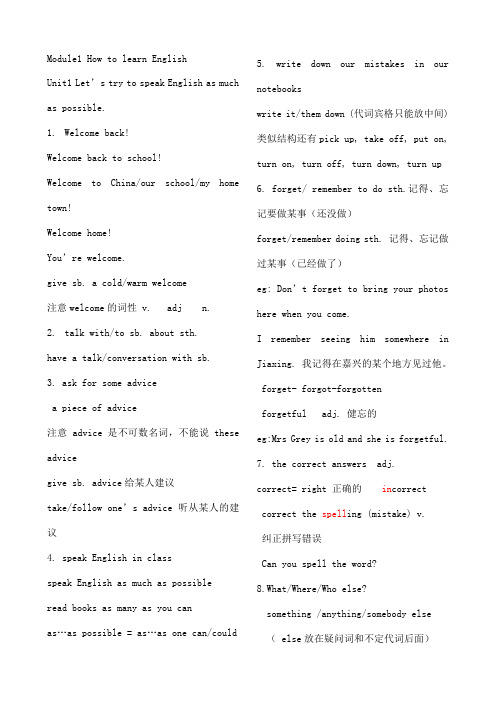
Module1 How to learn EnglishUnit1 Let’s try to speak English as much as possible.1.Welcome back!Welcome back to school! Welcome to China/our school/my home town!Welcome home!You’re welcome.give sb. a cold/warm welcome注意welcome的词性 v. adj n.2.talk with/to sb. about sth.have a talk/conversation with sb.3. ask for some advicea piece of advice注意advice是不可数名词,不能说these advicegive sb. advice给某人建议take/follow one’s advice听从某人的建议4. speak English in classspeak English as much as possible read books as many as you canas…as possible = as…as one can/could 5. write down our mistakes in our notebookswrite it/them down (代词宾格只能放中间) 类似结构还有pick up, take off, put on, turn on, turn off, turn down, turn up 6. forget/ remember to do sth.记得、忘记要做某事(还没做)forget/remember doing sth. 记得、忘记做过某事(已经做了)eg: Don’t forget to bring your photos here when you come.I remember seeing him somewhere in Jiaxing. 我记得在嘉兴的某个地方见过他。
外研版八年级英语上册Module1-Unit1完整ppt课件
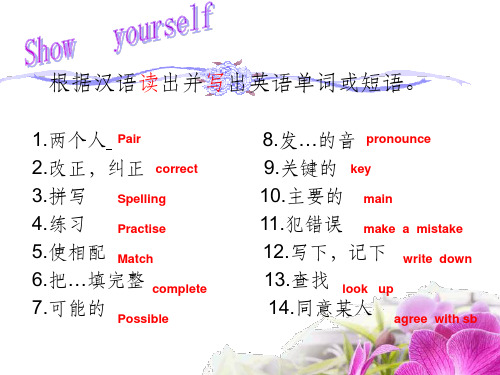
5.Match the words with their meaning.
plete the sentences with the words in the
box.
.
4
1.Read the Dialogue in groups 2.Translate the Dialogue in groups
2. 为什么你们不完成家庭作业?
Why don’t you finish your homework?
3.为什么不在公园里散步?(take a walk)
Why not take a walk in the park?
.
10
Practice
1.听收音机怎么样?
How /What about listening to the radio? 2. 步行去学校怎么样?
agree with sb
Hale Waihona Puke .1Module 1 How to learn English
Unit 1 Let’s try to speak English as much as possible
讲课人:程琳
.
2
1、会翻译主要对话 2、学会运用提建议的句型 3、通过学习提出建议,掌握与他人交流时
语言的得体性
根据汉语读出并写出英语单词或短语。
1.两个人 Pair
2.改正,纠正 correct
3.拼写 Spelling
4.练习 Practise 5.使相配 Match 6.把…填完整 complete 7.可能的
Possible
8.发…的音 pronounce
9.关键的 key
10.主要的 main
11.犯错误 make a mistake 12.写下,记下 write down 13.查找 look up 14.同意某人
【精选】外研版八级英语上册电子课本(完整版)
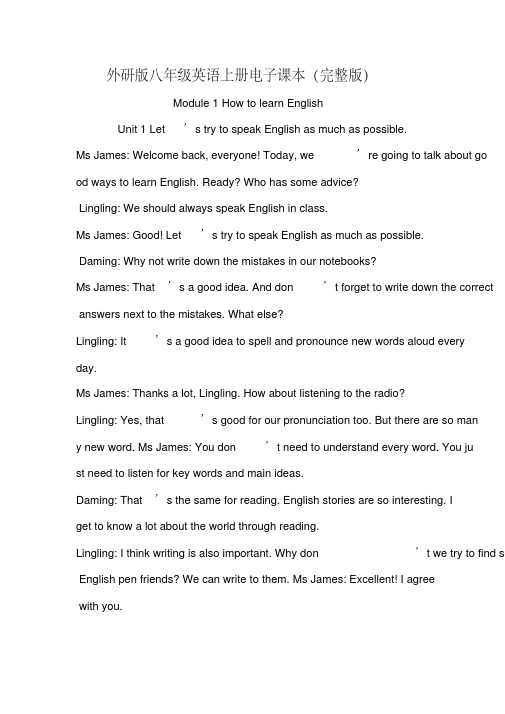
外研版八年级英语上册电子课本(完整版)Module 1 How to learn EnglishUnit 1 Let’s try to speak English as much as possible.Ms James: Welcome back, everyone! Today, we’re going to talk about good ways to learn English. Ready? Who has some advice?Lingling: We should always speak English in class.Ms James: Good! Let’s try to speak English as much as possible.Daming: Why not write down the mistakes in our notebooks?Ms James: That’s a good idea. And don’t forget to write down the correct answers next to the mistakes. What else?Lingling: It’s a good idea to spell and pronounce new words aloud everyday.Ms James: Thanks a lot, Lingling. How about listening to the radio?Lingling: Yes, that’s good for our pronunciation too. But there are so many new word. Ms James: You don’t need to understand every word. You just need to listen for key words and main ideas.Daming: That’s the same for reading. English stories are so interesting. Iget to know a lot about the world through reading.Lingling: I think writing is also important. Why don’t we try to find s English pen friends? We can write to them. Ms James: Excellent! I agreewith you.Unit 2 You should smile at her!Send your questions to Diana, the Language Doctor.Many students ask for advice about how to improve their English. Hereare three basic questions.The first question is about understanding English films and songs. Li Hao from Hubei wrote, “I like watching English films and listening to English songs, but I can only understand a little. What can I do?” Watching films and listening to songs are great way to learn English!Watch and listen several times, and guess the meaning of the new words.Each time you will learn something new. I also advise you to talk about the films or songs with your friends.The second question is about speaking. Wang Fan from Jilin wrote,ur school has a teacher from the US. I am shy and I am afraid to speak toher. What should I do?” You can say, “Hello! How are you?”“Do you like China?” These ar d ways to start a conversation. And before you begin, you should smile ather! Remember this: Do not be shy. Just try.The third question is about vocabulary. Zhang Lei from Anhui wrote,write down new words, but I forget them quickly. How can I remember them?” Do not worry. It is natural to forget new words! I suggest you write four or five words a day on pieces of paper and place them in your room. Read the words when you see them, and try to use them.Module 2 My home town and my countryUnit 1 It’s taller than many other buildings.Tony: Hey, Daming! How was your weekend?Daming: Pretty good! I went to Shenzhen.Tony: Where’s Shenzhen?Daming: Well, it’s on the coast near Hong Kong. It was a small village about thirty years ago, but today it’s a very big city.Tony: So it’s a newer city than Hong Kong?Daming: Yes, it’s a newer city. In fact, it only became important in the 1980s.It’s getting bigger and busier. Some day it will become as busy as Hong Kong, I’m sure.Tony: What’s the population of Shenzhen?Daming: It’s over ten million, I think. That’s larger than the populatio many other cities in China. Its streets are much wider and cleaner too. I think it’s a beautiful city.Tony: I’d like to go to there one day.Daming: Remember to visit the Diwang Tower. It’s taller than many othe r buildings in Shenzhen.Unit 2 Cambridge is a beautiful city in the east of England.Cambridge, London and EnglandBy Tony SmithI come from Cambridge, a beautiful city in the east of England. It is o n the River Cam and has a population of about 120,000. My home is espe cially famous for its university. Many famous people studied here, such a s Isaac Newton and Charles Darwin. There are lots of old buildings and c hurches to visit. Students and tourists enjoy trips along the river by boat.Cambridge is 80 kilometres from London. London is in the south of E ngland and it is on the River Thames. It has a population of about seven a nd a half million, so it is bigger and busier than Cambridge. It is about 2,0 00 years old, and it is famous for Big Ben, Buckingham Palace and Towe r Bridge.England itself is a part of an island, and you are always near the sea. The small villages and beaches on the coast are popular for holidays. Tou rists like the areas of low and beautiful lakes in the north, and the hills an d pretty villages in the south. Everywhere in England you will notice how green the countryside is.It is never very hot in summer or very cold in winter. So come and see England any time of the year, but bring an umbrella with you. You will need it most days.Module 3 SportsUnit 1 Nothing is more exciting than playing tennis.Daming: Hey, Tony. Come and watch the football match on TV.Tony: OK. What’s the score?Daming: Spain scored a minute ago.Tony: Wow! That’s fast!Daming: That’s right. Last week the match on TV was so boring becauseno one scored at all. So this week’s match is already more exciting. Betty: What’s the matter with you, Tony? You look tired.Tony: I’m really tired after last night’s tennis match. And I hurt my kn Daming: That’s too bad! Sit down and watch the match. It’s safer th ying tennis.Betty: Yes, watching is not sure about that. Nothing is more relaxing too!Tony: Well, I’m not sure about that. Nothing is more enjoyable than playing tennis.Betty: But you enjoyed watching the Olympics on TV, right?Tony: Yes, but that’s because it was cheaper than buying tickets for all th e games.Daming: And staying at home was easier than going to the stadium. Oh, look at that!Tony: Oh, he missed! Oh, bad luck!Daming: Never mind. There’s still plenty of time for them to score.Unit2 This year we practice more carefully.Training hardBy Li Daming It is Saturday tomorrow, but I am going to school. I am not going for l essons, but to play football. I am in our school team and we are going to play against another school next week. The practice starts at 10 am. We all arrive as early as we can so that we have time to warm up. We are training harder than usual because the other team beat us last year. This year we want to do better.It is more difficult to practise in winter because the days are short andthe weather is cold too. It gets dark earlier, so it is important not to be latefor after-school practice.Our coach is pleased because we are playing better as a team now. Last year we were sometimes careless when we passed the ball and we lost to the other team in the final match. What a pity! This year we practise more carefully. That means we have a better chance of winning.The fan club has fewer people this year. We hope to play well so thatwe have more fans to watch the matches. It is good to have our fans around. They cheer us on loudly and we feel more confident to win the game.Module 4 Planes, ships, and trainsUnit1 He lives the farthest from schoolBetty: I was late for school today.Mum: Why? What happened?Betty: I took the bus. There was a road accident, and the traffic was veryheavy. But nobody was late, except me. Maybe I should go to school by taxi.Mum: It’s the most comfortable way, but it’s also the most expensive. Betty: Then what about going by bike?Mum: That’s a good choice, but it’s a bit dangerous. There’s so m fic.Betty: But most of my classmates ride bikes, and it’s quite safe. Don rry. I’ll be carefull.Mum: How does Tony go to school?Betty: He lives the farthest from school, so he takes the underground.Mum: And what about Lingling?Betty: Her home is the closest to school, so she walks.Mum: How about Daming?Betty: He goes by bus too, the same as me. But it’s so crowded! And t raffic is heavy.Mum: All right. You can ride your bike to school, but remember to be careful all the time.Unit2 What is the best way to travel?Question: What is the best way to travel from London to Amsterdam.I am planning to travel from London to Amsterdam. How long does the journey take and what is the best way to travel? Could you please tellme about the trains or ships to get there? The more information, the better. Thanks!Best answer: There are four ways to travel.A journey by train is more relaxing than by coach, but a lot more expen sive. When you go by train, buy your ticket a long time before you travel. It is usually cheaper. You can go by car and by ship across the North Sea. This is the most comfortable way to travel but also the most expensi ve. Book your ticket before you book your hotel. Remember that parking in Amsterdam is very expensive, so stay outside the city centre and travel in by bus or by train.The third choice is by coach. This is usually the cheapest, but in summ er the coaches sometimes get crowded! And it takes you about twelve hou rs to get there. However, it will not cost as much as going by train.Finally, you can fly. It is the fastest and the second cheapest, but you may have to wait for hours at the airport because of bad weather.Well, I hope this helps! Have a great trip.Module 5 Lao She TeahouseUnit 1 I wanted to see the Beijing Opera.Listen and readBetty: Lingling and I went to Lao She Teahouse last night.Tony: How was it?Betty: It was great! You know, I wanted to see Beijing Opera, so Lingling offered to take me there. We drank tea and watched an opera.Tony: Did you understand the opera?Betty: No, it was difficult to understand the words. But the actors and actress were excellent.Tony: How long did you stay?Betty: We only planned to watch for an hour, but in the end, we stayed for three hours.Tony: Did you enjoyed it?Betty: Well, it was interesting---that’s the main thing. I hope to understand more next time.Tony: Do you often go to see Beijing Opera, Lingling?Lingling: No, I don’t. I wanted to take Betty to the teahouse because it amous.Tony: Who is Lao She? Betty: No idea. Ask Lingling.Lingling: Lao She is a great writer. He’s especially famous for his play T eahouse.Unit 2 It describes the changes in Chinese society.2 Read the passage and match the heading with the paragraphs.a) Lao She Teahouseb)The Story of Teahousec)Lao She1Teahouse is one of Lao She’s most famous plays. He wrote it in 1957. The play has three acts and shows the lives of common people in Chinafrom the end of the nineteenth century to the middle of twentieth century.It tells us the story of Wang Lifa and the customers of his teahouse in Beijing. It describes the changes in Chinese society over fifty years around the beginning of the twentieth century.2Lao She was born in Beijing in 1899. His mother sent him to a teacher’s school in 1913. After finishing school in 1918, he became a head teacher of a primary school. In 1924 Lao She left home and went to England.He taught Chinese at a college in London and returned to China five years later. He wrote many plays, novels and short stories about people, and was named “the People’s Artist”. Lao She is one of the greatest Ch nese writers of the twentieth century.3At Lao She Teahouse today, customers can drink tea and eat delicious Beijing food. If you like the Beijing Opera, traditional music or magic shows, you can enjoy them at the teahouse. Lao She Teahouse gives a warm welcome to everyone from all over the world.Module 6 Animals in dangerUnit 1 It allows people to get closer to them.Listen and read(Lingling and Betty are leaving the zoo)Lingling: Did you like the zoo?Betty: Yes! I saw the pandas at last! But I am more interested to see the pandas in the Wolong Panda Reserve, because it allows people to get closer to them.Lingling: It’s sad to think of the pandas and other animals in danger.Betty: We need to protect them better.Lingling: Yes, Many wild animals don’t have a safe place to live, because villages and farms are growing bigger and are taking away their land andforests.Betty: Also, often there isn’t enough clean water, because we’vedirty. I think we all need to help animals live in peace. Look, thereice.Lingling: It says,“Help! We want to save animals in danger, and we needyour help.” Betty: But what can we do?Lingling: It says,“Your money pays to look after the animals.”Th we can give money to help protect the animals.Betty: Maybe we can raise some money at school. Let’s find out what e e we can do to save as many animals as possible.Unit 2 The WWF is working hard to save them all.2 Read the passage and match the heading with the paragraphs.a)Nature parks for pandasb) WWF And animals in dangerc) The panda’s homed) An animal in danger1Pandas are in danger. There are only about 1,600 pandas living in the wild today. Zoos and research centres are looking after about 340 pandas. Pandas do not have many babies, and baby pandas often die. The situation is getting very difficult. Scientist are doing a lot of research to help pa ndas produce more babies and help baby pandas live.2Pandas live in the forests and mountains of Southwest China. Each p anda needs to eat a lot of bamboo every day. The bamboo forests are getti ng smaller, so pandas are losing their home. And there are not many pand as left.3In order to protect pandas in the wild, the government is setting up n ature parks and developing other plans. The nature parks will be big and t here will be more bamboo to feed the pandas. Pandas born in zoos may g o back to live in the nature parks.4The World Wild Fund for Nature (WWF) wants to protect all animal s. And it chose the panda to be its symbol. We do not want to lose tigers, elephants, or any other animals, so the WWF is working hard to save the m all.Module7 A famous storyUnit1 Alice was sitting with her sister by the river.Tony: Hi,Lingling!Lingling: Ssh! I’m reading.Tony: Sorry! What’s the book about?Lingling: It’s about a girl called Alice. One day, Alice was sitting with her sister by the river and she saw a white rabbit with a watch. It ran past.Tony: Why was it running? Lingling: Because it was late. Tony: And where was it going?Lingling: To see the Queen of Hearts. Alice followed it and fell down a hole in the ground.Tony: Yes! Then she saw the Cheshire Cat. It was sitting in a tree and smiling at everyone.Lingling: Then Alice arrived at the March Hare’s house. He was sitting with the Mad Hatter and a mouse. They were having a tea party in the garden.Tony: And then Alice met the Queen of Hearts. She was playing a strangegame!Lingling: Do you already know the book?Tony: Yes, It’s Alice’s Adventures in Wonderland. Everyone in Britain k nows the story.Lingling: Then why did you ask me all those questions?Tony: To see if you remember the story! Ha ha….U2 She was thinking about her cat.Alice was sitting with her sister by the river and her sister was reading a book. Alice had nothing to do. Once or twice she looked into her sister’a book. “And what is a book for,” thought Alice,”without pictures nversations?” Suddenly a white rabbit with pink eyes ran by.There was nothing strange about that. She heard the rabbit say,ear! Oh dear! I’ll be late!” and she did not think it was strange. Then the r abbit took a watch out of its pocket and looked at it. A rabbit with a pocket and a watch. Alice got up and ran across the field after it. She saw it godown a large rabbit hole in the ground.Then Alice went down after it, but never thought about how she wasgoing to get out again. She found that she was falling down a very, verydeep hole. It was too dark for her to see anything. She was falling for a long time. While she was falling, she was thinking about her cat, Dinah. Suddenly she landed on some dry leaves…Module 8Unit1 while the lights were changing to red ,a car suddenly appearedBetty: Good morning, Ms James! You look pale. Are you all right?Ms James: Im OK, but I saw an accident. A boy was riding his bike and listening to music on the road.Daming: That’s very dangerous!Ms James: I was waiting to cross the road. While the lights were changing to red, a car suddenly appeared round the corner. It wasn’t going ut it didn’t stop.Lingling: Did the boy stop?Ms James: No. And the driver was talking on his mobile phone.Betty: So did the car hit the boy?Ms James: No, I’m glad to say. The car stopped just in time, but the boy fell off his bike and hurt his knee.Tony: That’s too bad.Ms James: So when youre on your bike, think about the risk of an accident! Pay attention, stop at the red lights and…..what else?Betty: Don’t ride too fastDaming : Don’t ride side by side with your friends.All: Don’t listen to music!Unite 2One day, when Henry was working in a restaurant, a snake suddenly a ppeared and bit his hand. A few days earlier, the snake arrived from Asia in a box of bananas. It climbed out and hid somewhere.“I was trying to pick it up when it bit me again. I threw it across the ki tchen, and it landed on a table.’’While the snake was lying on the table, Henry quickly picked up hismobile phone and took a photo with it. Then the snake hid behind the fridge When Henry was trying to find the snake,his hand began to hurt badly. He hurried to hospital. As the doctors were checking him, the pain got worse . But they could not help him because they did not know what kind of snake bit him.As he was lying there in great pain, Henry suddenly remembered thephoto. The doctors sent the photo to a zoo. As soon as they learnt whatkind of snake bit him, they gave Henry the right medicine and he left hospital the next day.“So if a snake bites you, take out your mobile phone or camera. Take its photo, and show the photo to the doctors ‘’, suggests Henry.“But as you know, the snake won’t smile!”Module 9 PopulationUnit1 the population of China is about 1.37 billionBetty: What are you doing?Tony: I’m preparing some notes for a report called “Our growing pop on.” Lingling: Well, were in the right place to talk about that! Beijing is a huge city with a big population that causes a lot of problems, such as too much traffic and noise.Betty: Its not only Beijing. Population increase is a big problem in manycountries. Do you know how many babies are born every minute in the world?Tony: No. Can you tell me?Betty: Over 250! That makes over 131.4 million births a yearLingling: I can’t believe it!Betty: The population of China is about 1.37 billion. Thats almost one fifth of the world’s population, that is, about 7 billion.Tony: Hang on a minute! I’ll write that down too!Betty: But in the future, Chinas population wont grow so fast, because families are getting smaller.Lingling: How do you know all this?Betty: I wrote my report yesterday!Tony: Great, thanks! Now I can write my report!Unit 2Jo is fifteen and lives in Parkville.When Jo’s grandparents first came to Parkville, it was a quiet village.They had a small house. Close to fields md hills. Parkville was near Arnwick, a city with 200,000 people. People from Parkville moved to Armwick to find jobs. And they needed places to live.However, it was expensive to live in the city centre, so the governmentbuilt flats outside the centre. Soon, Parkville became part of Arnwick.And Arnwick became a city with over a million people. Jo’s family lives one of those flats. It is very crowded, and rubbish is also a problem.The small local school in Parkville closed down five years ago, so Jo now has to go to a school in Arnwick with 2,000 pupils. It takes an hour toget there by bus. There is a lot of traffic and pollution. It is clear that Arnwick needs more schools, buses and hospitals. It needs fresh air clean water and better public services. It also needs more police to protect its people. But to do all these things, it needs more money.However, can money help solve all these problems? Do we need more big cities like this? In fact, this is just a story. In fact, this is just a story.But it describes what is happening all over the world. Could it be yourtown some day?Module 10 The weatherUnit 1 It might snowBetty: Hey, boys!Tony: Hi, Betty. Hi, Lingling, Where are you going?Betty: We’re going to the park to skate, There’s thick ice on the lake, e you coming with US?Tony: Are you joking? It’s really cold today.Daming: And it’s cloudy too so it might snow.Lingling: What’s the temperature?Tony: It’s between minus eight and minus two degrees! Winter is colderhere than i England.Daming: Is it snowy in England in December?Tony: Not usually, although this year it snowed quite a lot, Most Decembers are we and rainy.Daming: What’s the weather like in America in winter, Betty?Betty: We have cold winters and hot summers. It’s snowy in New York in winter.Tony: Sounds great ! I like sunny weather, and I like snow as well. But Idon’t like showers or windy weather.Betty: Me neither, Rainy weather is terrible! I wish I were in Australia now, It’s Probably sunny and hot there.Lingling: You can go to Hainan lsland if you like sunny weather.Betty: One day I will.Lingling: Come on, better get going! We can skate in the park and get warm.Unit 2 The weather is fine all year round.The US is a very big country.It is about 3,000 miles from the east coast to the west coast, so choosecarefully the places to see and the time to go. Bring a map because youmay want to travel around. New York and Washington D.C. are good places to visit in May or October, but in winter there is a lot of snow.The best time to visit New England is in September.The weather gets cooler, and the green leaves start to turn gold, then br own. Bring your camera so you can take photos of the autumn trees.Cali fornia is on the Pacific coast, and the weather is fine all year round. Take your swimming clothes because you might want to go swimming in the s ea, even in December.In Seattle, in the northwest, it is not very cold but it rains a lot, so bring an umbrella.In Alaska the days are long and warm in summer, but may be cool in the evening. In winter, Alaska can be very very cold. If you want to visit Al aska, you had better go in summer. D o not forget to bring a warm sweat er with you.In Texas and the southeast, it is usually very hot and sunny compared t o other places.There are storms from time to time in summer and autumn.So when is the best time to visit the US? Any time you like!Module 11 Way of lifeUnit 1 In China, we open a gift laterBetty: Happy birthday, Lingling.Daming: Here’s your gift.Lingling: Oh, you remembered! What a surprise!Tony: You can open it!Lingling: I don’t think I should open it now. In China, we open a gift later.Betty: But back in the US, we open a gift immediately.Lingling: So what do I do?Betty: You needn’t wait!(Lingling opens her present and finds a dictionary.)Lingling: Oh, thank you. I really wanted one.Betty: We’re happy you like it.Tony: I noticed another difference. In China, you accept a gift with both hands. But in the West, we usually don’t pay much attention to that. Betty: That’s interesting! I’m interested to know all the Chinese traditions . Tell me more.Lingling: There are a lot. For example, in my home town, people say youmustn’t do any cleaning on the first day of the Spring Festival. And youmustn’t break anything. It’s bad luck!Daming: You must only use red paper for hongbao because red means luck. And you’d better not cut your hair during the Spring Festival month.Daming: And in the north of China, people eat lots of jiaozi!Betty: Perfect! They taste great.Tony: I like eating jiaozi too. Anyway, the Spring Festival is still over a month away. Let’s celebrate Lingling’s birthday first!Unit 2 In England you usually drink tea with milk.My experiences in England. I went to England last year. I enjoyed m y stay, and I noticed something interesting with the English way of life.Fo r example, you must say Mr or Mrs when you meet someone for the first t ime. When you get to know each other better or when they ask you to, yo u can just use their first names.One day we visited some friends and had afternoon tea together. After noon tea is not just a drink but a light meal at around 4 pm. We ate sand wiches and a large fruit cake.In England you usually drink tea with milk.So I tried to drink tea with milk too.Fish and chips is the traditional food in England. You can buy it and eat it in special fish and chip shops on the high street, or you can take it away a nd eat it with your fingers. It is delicious!At the bus stop you must not push your way onto the bus. Y ou need to stand in a line behind the other people and wait your turn. Sometimes people are slow to get on the bus.Once I noticed a gentleman touch a young man on the shoulder, smilepolitely and say, “Excuse me! Are you waiting for this bus?” He w y polite.Module 12 HelpUnit1 What should we do before help arrives?Ms James: This mornings class is about first aid, or giving someone basic medical help. Let’s imagine an accident. A boy is lying at the bottomof the stairs. He isn’t moving or making a sound. He is in pain. What canwe do to help him? Betty: First of all, find out what’s wrong with Ms James: How do we do that?Betty: Ask him.Ms James: Ok. But he could have trouble hearing you or speaking to you.Lingling: Shout for help? Call 120?Ms James: Good idea, but what should we do before help arrives?Tony: Make him comfortable.Ms James: And how can we do that?Tony: Lift him up and sit him on a chair?Ms James: No, that could be harmful! You could drop him and hurt him even more. Betty, you must know! You did some basic medical training.Betty: Make sure he’s warm. Cover him with a coat.Ms James: That’s such good advice that you could be a doctor, Betty!Unit 2 Stay away from windows and heavy furniture.What to do in an earthquakeEarthquakes always happen suddenly, so it is difficult to warn people about them.Usually people have little or no idea about what to do during an earthquake, so here is some advice. Inside Do not jump out of high buildings. Hide under a table. Stay away from windows and heavy furniture. Keep clearof fires. Leave the building quickly when the ground stops shaking, but do not use the lift.Keep calm, especially when you are with other people. Be brave and be helpful.Outside Move away from buildings, because parts of a building may fall on you. Do not stand near street lights or under power lines. Stay awa y from bridges and trees. If you are in a bus or car, stay in it.In the mount ains, be careful of falling rocks.On a beach, run away from the sea and m ove quickly to higher ground.In short, follow what you learnt in school. You can be safe and you ca n also help save others。
外研版英语八年级上册Module 1 全部课件

3. How does Daming usually check the spelling of a word?
Why not…?
Why don’t we/you…?
Don’t forget to…
It’s a good idea to…
How about…?
Read after the flash.
Underline the correct words and expressions.
Here is my (1) advice / notebook on learning English. Speak English (2) always / as much as possible in class, and listen to English (3) in the newspaper / on the radio. I (4) agree / forget it is a good idea to look up new words in the (5) notebook / dictionary. You can find the (6) correct / excellent pronunciation and learn the meaning.
M1 Unit 1 Let’s try to speak English as much as possible.
初二年级 英语
八年级上册英语m3u1课文翻译

八年级上册英语m3u1课文翻译外研版八年级英语上全册课文翻译Module 3 运动Unit 1 没有什么比打网球更令人兴奋大明:嘿,托尼。
过来看电视上的足球赛!托尼:好。
比分是多少?大明:西班牙(队)一分钟前得分了。
托尼:哇!太快了!大明:是呀。
上周电视上的比赛很无聊,因为根本没有人进球。
所以这周的比赛已经令人兴奋多了。
贝蒂:你怎么了,托尼?你看起来很疲倦。
托尼:昨天晚上的网球比赛之后我确实很累,我还伤到了膝盖。
大明:太糟糕了!坐下来看比赛吧,这比打网球更安全。
贝蒂:是啊,看比赛没有危险,也使人更加放松!托尼:哦,对此我不确定。
没有什么比打网球更令人愉快的。
贝蒂:但你喜欢在电视上看奥林匹克运动会,对吗?托尼:是的,但那是因为对所有比赛来说,通过电视看(比赛)比买票看(比赛)更便宜。
大明:待在家中比去体育场更容易。
哦,看!托尼:哦,他未射中!哦,运气太差了!大明:没关系。
还有很多时间,他们可以得分。
Unit 2 今年我们练习的更认真努力训练明天是星期六,但我要去学校。
我并非去上课,而是去踢足球。
我是校队成员,我们下周将要和另一所学校比赛。
练习从上午 10 点开始。
我们都尽可能早地到校,以便我们有时间热身。
我们比平常更加努力地训练,因为另一支球队去年打败过我们。
今年我们想踢得更好。
在冬天训练更加困难,因为白天短,天气也寒冷。
夜幕降临得更早,所以不要误了课外训练很重要。
我们的教练很高兴,因为现在我们整个球队配合的更好。
去年我们在传球的时候有时很粗心,在决赛中我们输给了另一支球队,多么可惜啊!今年我们更加认真地训练。
那意味着我们获胜的可能性更大。
外研版八年级上册英语Module3Unit1
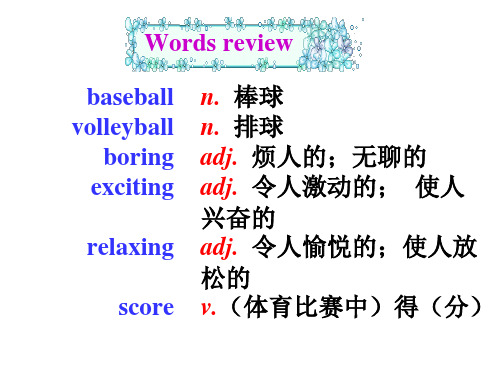
ecxhpeeanpseivre than buying tickets for the games.
√ 5 Going to the stadium was more difficult
than staying at home.
more dangerous
difficult
more difficult
…is more …/ …er than ….
popular exciting relaxing enjoyable interesting expensive cheap safe easy
running
swimming
basketball
boring interesting expensive cheap safe easy tiring
running basketball tennis
swimming
table tennis football What do you think of
volleyball …?
I
baseball think it’s
累人的 / 放松的
I think swimming is tiring.
dangerous / safe
危险的 / 安全的
I think boating is dangerous.
Talk about the sports in pairs. difficult dangerous popular exciting relaxing enjoyable
B: Volleyball and tennis. Tennis is fun. D: I like table tennis. It’s a faster game than tennis. B: I’ll play table tennis with you.
外研版英语八年级上册Module 1单元知识点归纳总结(详细版)
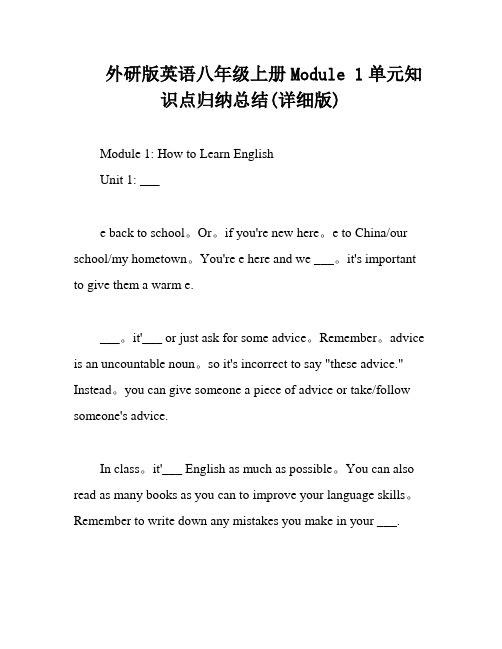
外研版英语八年级上册Module 1单元知识点归纳总结(详细版)Module 1: How to Learn EnglishUnit 1: ___e back to school。
Or。
if you're new here。
e to China/our school/my hometown。
You're e here and we ___。
it's important to give them a warm e.___。
it'___ or just ask for some advice。
Remember。
advice is an uncountable noun。
so it's incorrect to say "these advice." Instead。
you can give someone a piece of advice or take/follow someone's advice.In class。
it'___ English as much as possible。
You can also read as many books as you can to improve your language skills。
Remember to write down any mistakes you make in your ___.Lastly。
it'___'ve done in the past。
For example。
don't et to bring your photos when you come here。
And if you have a etful memory。
you may need to write things down to remember them。
Overall。
外研版英语八年级上册 Module1 Unit1 知识点 (共16张PPT)

Language points
1. practise v.动词= practice(美) Practise saying the words.练习说单词。 practise doing练习做某事 eg: Amy practise _______(play) the piano for over two hours.
look up
查;查找
学习目标
学完本堂课,学生能够: 1. 跟读课文,复述句子。 2. 背过前半段课文或重点句。 3. 能区分表达建议的句型的用法,并针对英语学习中的困难进行讨论, 给出建议。 4. 能够理解并记住课文中的语言知识点
跟读课文,复述句子
第一部分对话AB/重点句C 背诵
Now read the dialogue and write notes about learning English.
3) forget to do
和
forget doing
忘记要去做某事(未做)
忘记做过某事(做过)
remember to do
八年级上册英语外研版各单元重点词汇总结

八年级上册英语外研版各单元重点词汇总结Unit 1: Hello!- greet: 问候greet:问候- introduce: 介绍introduce:介绍- family: 家庭family:家庭- age: 年龄age:年龄- hobby: 爱好hobby:爱好Unit 2: School Life- subject: 学科subject:学科- classroom: 教室classroom:教室- homework: 家庭作业homework:家庭作业- test: 测试test:测试- teacher: 老师teacher:老师Unit 3: My Week- weekend: 周末weekend:周末- Monday: 星期一Monday:星期一- Tuesday: 星期二Tuesday:星期二- Wednesday: 星期三Wednesday:星期三- Thursday: 星期四Thursday:星期四Unit 4: Leisure Time- read: 读read:读- watch TV: 看电视watch TV:看电视- play sports: 运动play sports:运动- listen to music: 听音乐listen to music:听音乐- go shopping: 去购物go shopping:去购物Unit 5: My Neighborhood- neighborhood: 附近neighborhood:附近- street: 街道street:街道- restaurant: 餐厅restaurant:餐厅- park: 公园park:公园- shopping mall: 购物中心shopping mall:购物中心Unit 6: Food and Health- food: 食物food:食物- fruit: 水果fruit:水果- vegetable: 蔬菜vegetable:蔬菜- exercise: 运动exercise:运动- healthy: 健康healthy:健康Unit 7: Festivals- festival: 节日festival:节日- celebrate: 庆祝celebrate:庆祝- tradition: 传统tradition:传统- firework: 烟花firework:烟花- decorate: 装饰decorate:装饰Unit 8: Daily Life- wake up: 醒来wake up:醒来- wash: 洗wash:洗- go to school: 上学go to school:上学- do homework: 做作业do homework:做作业- go to bed: 上床睡觉go to bed:上床睡觉以上是八年级上册英语外研版各单元的重点词汇总结。
外研版八年级英语上册全部课文及翻译
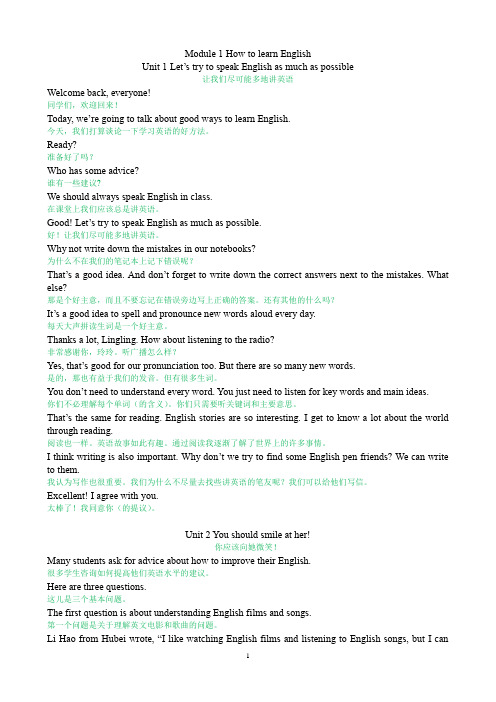
Module 1 How to learn EnglishUnit 1 Let’s try to speak English as much as possible让我们尽可能多地讲英语Welcome back, everyone!同学们,欢迎回来!Today, we’re going to talk about good ways to learn English.今天,我们打算谈论一下学习英语的好方法。
Ready?准备好了吗?Who has some advice?谁有一些建议?We should always speak English in class.在课堂上我们应该总是讲英语。
Good! Let’s try to speak English as much as possible.好!让我们尽可能多地讲英语。
Why not write down the mistakes in our notebooks?为什么不在我们的笔记本上记下错误呢?That’s a good idea. And don’t forget to write down the correct answers next to the mistakes. What else?那是个好主意,而且不要忘记在错误旁边写上正确的答案。
还有其他的什么吗?It’s a good idea to spell and pronounce new words aloud every day.每天大声拼读生词是一个好主意。
Thanks a lot, Lingling. How about listening to the radio?非常感谢你,玲玲。
听广播怎么样?Yes, that’s good for our pronunciation too. But there are so many new words.是的,那也有益于我们的发音。
外研版八上Module 8 Unit 1 教案
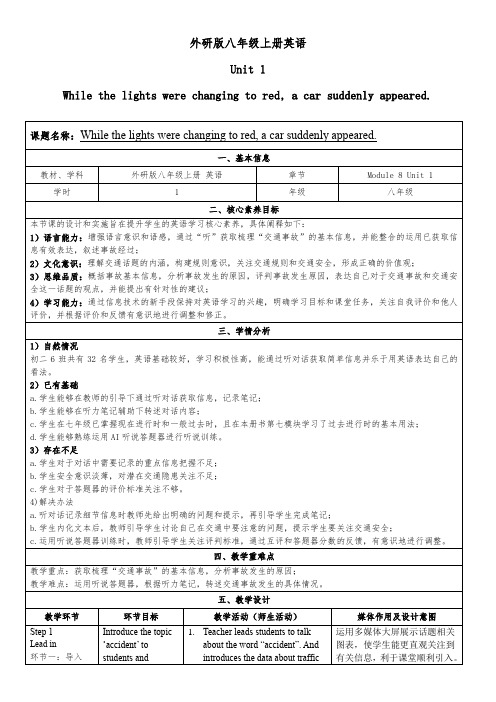
Step 3
While listening I
环节三:听中活动
Help students know about the accident from the aspect of the driver.
从对话一视角了解交通事故的基本信息。
Teacher leads students to listen to the dialogue between the policeman and the driver, get the general information first and then take notes of the details.
2.探究交通事故(Accident)的意义为线索,便于理解
本节课的主要以学生遇到的交通事故为课程线索,通过预测事故情况,关注事故发生的时间,地点,人物,结果,分析原因。引导学生一步一步了解事故的相关信息,便于学生理解和课后输出活动的展开。
3.作业设计富含学科育人理念,贴近学生自身生活,
安全教育是中学生必备的一课,作业设计为给中学生的交通安全建议,即关注了课文内容又与学生个人生活有联结。
教师引导学生通过听对话一关注交通事故的一部分信息。
运用多媒体大屏播放音频,有利于学生获取信息。
Step 3
While listening II
环节三:听中活动
Teacher leads students to listen to the dialogue between Ms James and her students.
3)思维品质:概括事故基本信息,分析事故发生的原因,评判事故发生原因,表达自己对于交通事故和交通安全这一话题的观点,并能提出有针对性的建议;
外研版英语八年级上册《Module1Unit2》说课稿

外研版英语八年级上册《Module 1 Unit 2》说课稿一. 教材分析外研版英语八年级上册《Module 1 Unit 2》的主要内容包括两个部分:课文内容和语言知识。
课文内容主要讲述了一个关于环境保护的故事,通过故事让学生了解到环境保护的重要性。
语言知识部分包括动词的一般过去时态、一般现在时态和一般将来时态的用法,以及相关的词汇和短语。
二. 学情分析八年级的学生已经具备了一定的英语基础,对于一般的英语句子和词汇能够理解和掌握。
但是,对于时态的运用和环境保护这个话题可能还比较陌生。
因此,在教学过程中,需要注重引导学生理解和运用时态,并激发他们对环境保护的关注。
三. 说教学目标1.学生能够理解课文内容,掌握相关的语言知识。
2.学生能够运用一般过去时态、一般现在时态和一般将来时态描述事情。
3.学生能够提高自己的环保意识,了解环境保护的重要性。
四. 说教学重难点1.教学重点:课文内容的理解和语言知识的掌握。
2.教学难点:一般过去时态、一般现在时态和一般将来时态的运用,以及环境保护话题的深入理解。
五. 说教学方法与手段1.情境教学法:通过设置情境,让学生在实际语境中学习和运用语言知识。
2.任务型教学法:通过完成任务,让学生主动学习和运用语言知识。
3.多媒体教学手段:利用多媒体课件和视频,丰富教学内容,提高学生的学习兴趣。
六. 说教学过程1.导入:通过展示环境保护的相关图片,引导学生思考环境保护的重要性,激发学生的学习兴趣。
2.新课呈现:通过播放课文动画,让学生初步感知课文内容。
3.课文讲解:引导学生跟读课文,讲解课文中的重点词汇和短语,讲解一般过去时态、一般现在时态和一般将来时态的用法。
4.课堂练习:设计相关的练习题,让学生运用所学的语言知识进行实践。
5.小组讨论:让学生分组讨论环境保护的话题,引导学生提出自己的观点和建议。
6.课堂总结:对所学内容进行总结,强调环境保护的重要性。
7.作业布置:布置相关的作业,让学生巩固所学知识。
(新版)外研版八年级上册英语《Module 1 Unit 1 Let''s try to speak

(新版)外研版八年级上册英语《Module 1 Unit 1 Let’’s try to speak English asmuch as possible》说课稿一. 教材分析《Module 1 Unit 1 Let’s try to speak English as much as possible》是外研版八年级上册英语教材的第一单元第一课时。
本节课主要围绕“尽可能多地说英语”这一主题展开,通过学习本节课,学生能够掌握一些基本的日常英语口语表达,提高他们的口语交际能力。
教材内容丰富,包括对话、听力练习、语法讲解和练习等,旨在为学生提供全面的语言学习材料。
二. 学情分析八年级的学生已经掌握了基本的英语语法和词汇,具备一定的英语听说读写能力。
但是,他们在口语表达方面还存在一定的困难,往往因为害羞、自信心不足等原因不愿意开口说英语。
因此,本节课的教学重点在于激发学生的口语表达欲望,提高他们的口语交际能力。
三. 说教学目标1.知识目标:学生能够掌握日常生活中的一些基本口语表达,如问候、介绍自己、询问他人情况等。
2.能力目标:学生能够听懂、会说、会读本节课所学的句子和词汇,提高他们的口语交际能力。
3.情感目标:激发学生学习英语的兴趣,培养他们积极主动地说英语的习惯。
四. 说教学重难点1.重点:学生能够掌握本节课所学的句子和词汇,并能够运用到实际情景中。
2.难点:学生能够克服害羞、自信心不足等问题,积极主动地开口说英语。
五. 说教学方法与手段1.任务型教学法:通过设置各种真实的任务,让学生在完成任务的过程中运用英语,提高他们的口语交际能力。
2.情境教学法:创设各种日常生活中的情景,让学生在情景中模仿、实践,增强他们的语言运用能力。
3.激励评价法:注重对学生的过程性评价,及时给予肯定和鼓励,提高他们的自信心。
六. 说教学过程1.热身活动(5分钟):通过播放英语歌曲,让学生放松心情,激发他们学习英语的兴趣。
- 1、下载文档前请自行甄别文档内容的完整性,平台不提供额外的编辑、内容补充、找答案等附加服务。
- 2、"仅部分预览"的文档,不可在线预览部分如存在完整性等问题,可反馈申请退款(可完整预览的文档不适用该条件!)。
- 3、如文档侵犯您的权益,请联系客服反馈,我们会尽快为您处理(人工客服工作时间:9:00-18:30)。
外研版英语八年级上册 Module 2 Unit 3(共31张PPT)
The buildings in the village in Picture 1 are older / smaller / lower than the buildings in the city in Picture 2. The buildings in the city in Picture 2 are newer / higher / bigger / taller than the buildings in the village in Picture 1. In Picture 2, the roads are wider / busier than those in Picture 1.
外研版英语八年级上册 Module 2igh low old small tall wide
The buildings in Picture 1 are older than the buildings in Picture 2.
外研版英语八年级上册 Module 2 Unit 3(共31张PPT)
size population
new
large
old
small
外研版英语八年级上册 Module 2 Unit 3(共31张PPT)
in the northeast is famous for on the coast pretty good The population of
1. Cambridge is a beautiful old English city. It _i_s_f_a_m_o_u__s_f_o_r__ its university.
外研版英语八年级上册 Module 2 Unit 3(共31张PPT)
Shenzhen Shanghai Xi’an
China Tian’anmen Square The population of Tianjin
Beijing Hangzhou Beijing Australia Other squares in Beijing The population of Shanghai
big cold large old tall 3. Beijing is old but Xi’an is much
_o_ld__er__. 4. The US has a large population but
India’s population is _l_a_r_g_e_r_. 5. Beijing is cold in winter but Harbin is
2. Tianjin is near Beijing, _o_n__th__e_c_o_a_s_t _ of Bohai Sea.
外研版英语八年级上册 Module 2 Unit 3(共31张PPT)
外研版英语八年级上册 Module 2 Unit 3(共31张PPT)
3. _T_h_e__p_o_p_u_l_a_ti_o_n_o_f__ India is smaller than that of China but bigger than that of Russia.
__c_o_ld_e_r__.
外研版英语八年级上册 Module 2 Unit 3(共31张PPT)
外研版英语八年级上册 Module 2 Unit 3(共31张PPT)
big busy high low old small tall wide
外研版英语八年级上册 Module 2 Unit 3(共31张PPT)
China is _b_i_g_g_e_r_ (big) than Australia.
Sanya is w__a_r_m_e_r_(warm) than Heilongjiang.
1. It’s getting _b_i_g_g_e_r and _b_u_s_ie_r__. 2. It’s a _n_e_w__e_r_ city than Hong Kong. 3. Its streets are _m_u_c_h_ _w_i_d_e_r and c_l_e_a_n_e_r
years ago but it is much _b_i_g_g_e_r___ now. 2. This building is tall but that building is much _ta_l_le_r_.
外研版英语八年级上册 Module 2 Unit 3(共31张PPT)
外研版英语八年级上册 Module 2 Unit 3(共31张PPT)
big cold large new old small warm
warm cold
large
small
weather
Pplalaccee
history
size population
new
large
old
small
warm cold
large
small
weather
Pplalaccee
history
new busy old big wide
small
For example: Shenzhen is newer than Beijing.
Shenzhen is busier than Hangzhou. Xi’an is older than Beijing. China is bigger than Australia. Tian’anmen Square is wider than other squares in China. The population of Tianjin is smaller than the population of Shanghai.
too. 4. It’s __ta_l_le_r_ _t_h_a_n__ many other buildings
in Shenzhen.
外研版英语八年级上册 Module 2 Unit 3(共31张PPT)
big cold large old tall 1. Shenzhen was very small about thirty
